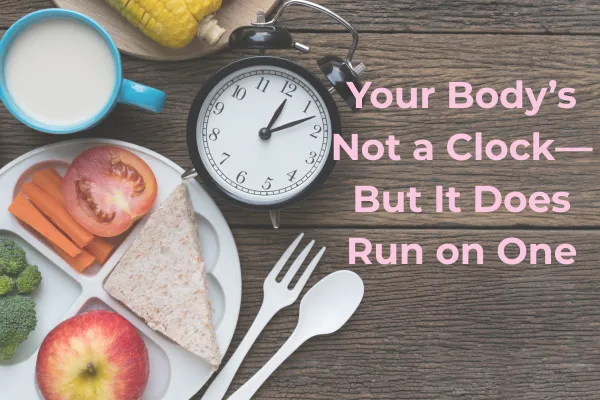
Your Body’s Not a Clock—But It Does Run on One
"I don’t have time to cook."
We hear it all the time. And listen—we get it. Between work, meetings, family responsibilities, and your ever-growing to-do list, cooking can feel like just one more thing. But here's the kicker:
Not prioritising your meals is costing you way more time, energy, and money than you realise.
We’re not talking about meal prepping like a fitness influencer or turning your Sunday into a Top Chef audition. We’re talking about blocking out one hour a week to set your future self up for success.
Here’s What That Hour Actually Buys You:
Reduced stress around food choices
Fewer last-minute runs to the shop
No more relying on takeout menus
Fewer crashes, cravings, and "hangry" decisions
More energy and focus during your workday
More control over what you’re eating
You can throw together a few nourishing meals and snacks for the week without needing a second fridge, colour-coded containers, or a Culinary Arts Degree from Le Cordon Bleu.
And the bonus? You’ll save a fair bit of money too. Because constantly buying convenience foods and eating out isn’t just rough on your digestion—it’s rough on your pocketbook. (When I started doing this for our family, our food bill dropped by a few hundred dollars a month!)
OK, but… Why Does Timing Matter?
Here’s where it gets interesting. Most midlife women are given a lot of information about what to eat—usually in conflicting, confusing ways. But almost no one’s talking about when to eat.
And that matters. A lot.
Your body isn’t a machine, but it does run on rhythms. Circadian rhythms, to be precise. These daily biological patterns affect:
Blood sugar regulation
Hormone balance
Energy cycles
Fat metabolism
Sleep quality
So if your typical routine looks like this:
Skip breakfast
Run through the morning on coffee or energy drinks
Eat something random at 2pm
Overeat at dinner
Snack until bedtime
…your body is basically shouting, "What are we even doing here?!"
That kind of chaos creates a lot of stress in the body. And guess what stress does?
Spikes cortisol (your fat-storing hormone). Eek. It also:
👉 Disrupts sleep
👉 Increases cravings
👉 Slows metabolism
Meal Timing Can Be Your Secret Weapon
We’re not talking about setting rigid food rules. It’s about building a simple, sustainable rhythm that works for your real life. Here are a few things to try:
Eat within a couple of hours of waking up to reset cortisol and fuel your brain.
Don’t save all your food for dinner—your body isn’t designed to run on fumes all day.
Carve out just a little prep time each week so you’re not making decisions when your brain is fried.
Midlife doesn’t have to feel like an episode of Survivor. You deserve consistent energy, clear thinking, and to not be side-eying the vending machine at 3 p.m.
TL;DR:
Meal timing matters. Meal prep doesn’t have to be hard. And you’ll feel so much better when you stop treating food (and your health) like an afterthought.
Start small. Keep it real. Let your body work with you—not against you.
And if you need help? We’ve got you. 💜
